“I don’t like my daughter watching movies on her phone. But I would rather her watch a movie on her phone than not watch a movie at all. People need movies. Movies never end” – giuseppe tornatore
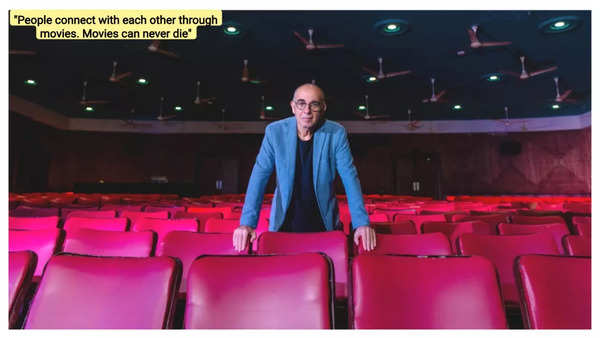
Giuseppe Tornatore at Regal Cinema, Mumbai
You don’t just grow up watching movies, you live through them. of the great Italian filmmaker Giuseppe Tornatore oscar winning film ,Cinema Paradiso‘ (1988) evokes this sentiment, serving as one of cinema’s most heartfelt love letters. The coming-of-age drama seen through the eyes of a young boy, Toto, and his heart-warming friendship with an aging projectionist, Alfredo, reflects not only the cinema that shapes but defines our life journeys – childhood, friendship, Nostalgia, first love, loss and longing. Thus it was fitting for Tornatore to make his first visit to India, an initiative of the film producer, Archivist Shivendra Singh Dungarpur‘S ‘Film Heritage Foundation‘To honor the unsung heroes of the film industry – The launcherThe three-day festival, which will conclude today, was showcased Italian classics restoredIn an exclusive conversation with Dungarpur, Tornatore shares his thoughts about India, Indian cinema, the longevity of his iconic film and much more. Part…
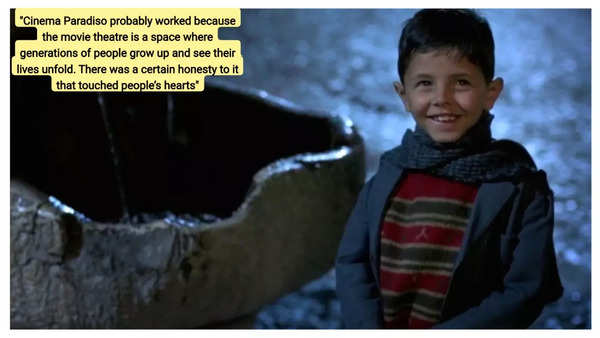
A scene from Cinema Paradiso
You made Cinema Paradiso 36 years ago, and it’s a film that is still watched and discussed among film lovers today. To what do you attribute its longevity?
You’re very generous. It is a big mystery to me that even after 40 years of its creation it is so popular and close to the people in every country. I presented it here as the opening film of the festival. Even today people of all ages call and write to me about this film. Yes, the film is autobiographical in parts. But not all autobiographical films get this kind of love and affection. It probably worked because movie theaters are a place where generations of people grew up and watched their lives unfold. Perhaps there was a certain sincerity in it that touched people’s hearts.
Luca Guadagnino, another great filmmaker from Italy, was in the city last year and he told us that India and Italy are similar in many ways. What do you think?
I agree with him. Yesterday I was walking down a city street with the crowd and I immediately felt a sense of belonging. I asked myself why I felt such a connection to this place, to these people. The life on the streets of Mumbai, the pace, the vibrancy, reminded me of the first big city I knew back home when I was young – Palermo in Sicily. Until six years ago, Palermo was the same… the noise, the chaos, the shouting, the shops, the street food, the colors, the fruit vendors. It was a very strong experience yesterday and I hope to spend some more time here before I leave.
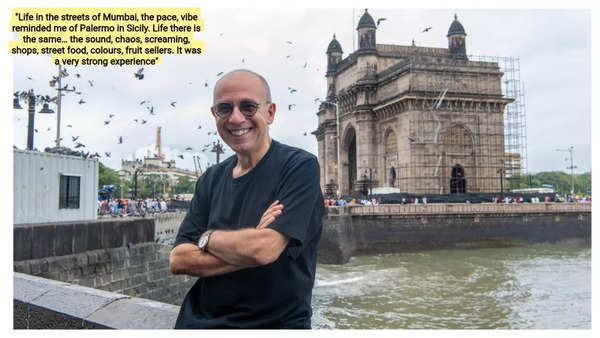
Giuseppe Tornatore at the Gateway of India in Mumbai
You have been fascinated by film projectionists since your formative years and were one of them yourself, so would you say it was fitting that during your first visit to India, you paid tribute to the unsung heroes of our cinema here – the projectionists?
I will confess a secret to you. Initially, I thought that films were made in cinema projection rooms. The concept of screening was not known to me. I started going to movie theaters like this (referring to Mumbai’s Regal Cinema) when I was six years old. I couldn’t understand how it was possible that characters who looked so huge on the big screen managed to reach there through the small window at the back of the theatre. For a long time I believed that the shadow of this man (the projectionist) was the creator of the film. I thought movies were made in projection rooms. When I got the opportunity to inspect that room, the projectionist seemed like a legend to me. I thought the films were not made there, but the idea I had remained in my mind before I understood the actual situation. When I was nine years old I met other projectionists and became one of them. That was my world. So, I am very happy to honor the projectionists here because it felt like I had given an award to all the projectionists that I met when I was younger.
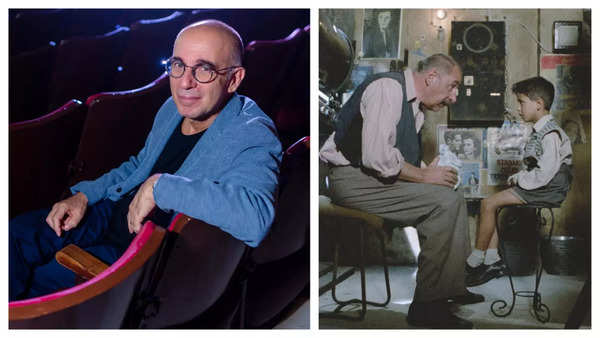
Giuseppe Tornatore at Regal Cinema, Mumbai
Are you familiar with Indian cinema?
I think what connects Indian and Italian cinema is realism. There is a lot of imagination in both, but the spirit and origins of this poetic cinematography in both cinemas is realistic. Satyajit Ray He was the first big director I knew when I was young. About a year ago I saw a movie, (pan pipe‘S) ‘Last Film Show’, which I believe was inspired by Cinema Paradiso. This film was India’s official Oscar entry, (did not win the nomination) so it was a big honor for him and me. I have also watched some clips of commercial Bollywood films and I am curious to know more about this world. Shivendra (Dungarpur) has promised me that he will take me on the shooting of these big Bollywood films someday. I am pleasantly surprised by the number of films made in India every year. The Indian film industry is one of the largest industries in the world. A country where around 2,000 films are made every year is heaven for me.
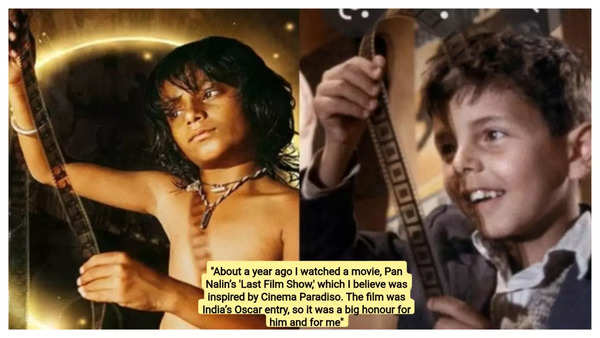
Pictures from ‘Last Film Show’ and ‘Cinema Paradiso’
In an ever-evolving digital world, how important is film preservation and restoration?
Tornado: People connect with each other through films. Politically, too, they are important because art transcends borders. Movies are no longer limited to any language. Shivendra and people like him are working to preserve and restore great films that are part of the history of humanity. Be it the work of Federico Fellini, Akira Kurosawa, Satyajit Ray, John Huston, or Alfred Hitchcock, to name a few. In future, if people will get the opportunity to watch these iconic films, it will be thanks to Shivendra and everyone working for this cause. They are important. They give eternal life to films.
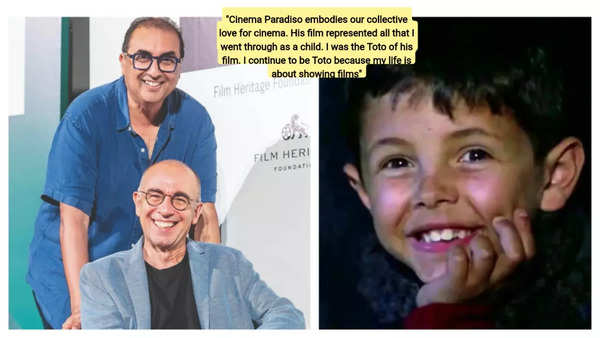
Film Heritage Foundation Founder Shivendra Singh Dungarpur with Giuseppe Tornatore
Shivendra: It’s an incredible feeling to have him here, because for me, his film (Cinema Paradiso) symbolizes our collective love for cinema. His film represents everything I went through as a child. I was Toto in his film. I remain Toto because my life is about showing films. We show movies to people for free. This is probably the most emotional moment for me. He has come here not only as a director, an artiste, but as a person who has kept cinema alive. And the fact that he started his career as a projectionist. He was a photographer, then he became a projectionist and he honored our projectionists. This is the most beautiful thing that has happened to cinema.
The Film Heritage Foundation is doing some great work to restore classics, but given the advent of technology and OTT platforms, do you fear that the longevity of cinemas will be affected?
Shivendra: From my perspective, we have kept cinema alive. Judging by the number of people who came for us (to this festival), it shows that basically, classic films are back. Today, take a look at the number of classics being re-released in multiplexes. It’s all thanks to the Film Heritage Foundation’s initiative to bring the classics back to theatres. Plus, the fact that we’re keeping the single screen alive is great. More than 1800 people registered for this Italian festival. These movies are available online, yet people flocked to theaters for that experience.
Tornatore: People watch more movies today than they did 50 years ago. Thanks to technology that gives you the opportunity to watch movies wherever and whenever you want. Ok. I don’t like my daughter watching movies on the phone. But I would rather watch a movie on my phone than not see it at all. People want movies. Movies never end. Maybe the traditional film business is outdated, but this will change and they will find a new way to move forward because today, film financing is extremely complex. As the technology of films changes, we can make films in a more simple way than before. But I am sure about one thing. There will always be a need for people to watch movies in this world. That’s why we have to make films. We will have to make films even if we don’t want to. (laughing).

















